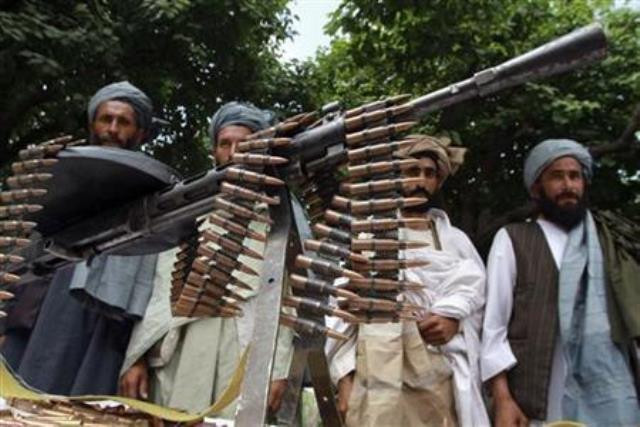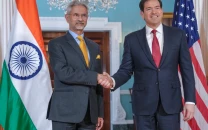White House, Afghan Taliban deny reports of talks
Raheel Sharif told Ghani during a visit this week that Taliban were willing to begin negotiations as early as March

Raheel Sharif told Ghani during a visit this week that Taliban were willing to begin negotiations as early as March. PHOTO: REUTERS
This was followed by a denial by the Afghan Taliban as well, who dismissed the reports as "fabricated".
"The United States currently has no meetings with the Taliban scheduled in Doha," said Bernadette Meehan, a spokesperson for the White House's National Security Council.
"We remain supportive of an Afghan-led reconciliation process whereby the Taliban and the Afghans engage in talks toward a settlement to resolve the conflict in Afghanistan."
Sources in the Afghan Taliban had said their negotiators would hold a first round of talks with US officials on Thursday in Qatar.
Earlier, senior Pakistani army and diplomatic officials said = the Afghan Taliban have signaled through the Pakistani military that they are willing to open peace talks, which could be held later in the day.
Sources within the Afghan Taliban said their negotiators would hold the first round of peace talks with US officials in Qatar later on Thursday, although no comment was immediately available from US or Qatari officials.
Previous efforts to negotiate an end to a war that began in late 2001 have proved fruitless, but the latest signals raised hopes of a much-needed boost for new Afghan President Ashraf Ghani.
"The first session will take place today in Qatar and then there would be another session on Friday. Let us see what happens as talks before did not yield any results," a senior member of the Afghan Taliban said by telephone from Qatar.
Bringing the Taliban to the negotiating table would be a major breakthrough in Afghan efforts to find a diplomatic solution to more than a decade of war following the withdrawal of most US-led troops last year.
Earlier on Thursday, a senior Pakistani military official said Pakistan's army chief of staff, Raheel Sharif, told Ghani during a visit this week that the Taliban were willing to begin negotiations as early as March.
Afghan Taliban reject ‘fabricated reports’ of talks with US
The Afghan Taliban dismissed as “fabricated” media reports that they would open talks with Americans in Qatar on Thursday, hours after reports suggested that a Taliban delegation has gone to Doha for negotiations.
“Some media outlets have issued reports in an irresponsible way that the Islamic Emirate will start talks with Americans in Qatar today. We categorically reject this claim and we don’t plan to hold talks in the Qatar office with anyone. The reports are untrue and far from reality,” Taliban spokesperson Zabihullah Mujahid said.
“The Taliban have neither changed their policy with regards to talks, nor have they given serious consideration to this option, because Afghanistan is still under foreign occupation,” he added.
He said thousands of “invading troops are practically based in Afghanistan and involved in operations.”
The Taliban spokesperson said they cannot hold talks with the Kabul administration, as it has “signed a security pact with the United States. It has deeply plunged in corrupt practices and is promoting un-Islamic activities in the country, and wants to extend stay of foreign invading troops in Afghanistan.”
"They have expressed their willingness and there will be progress in March. But these things are not so quick and easy," the official, who is close to Pakistan's powerful army chief, told Reuters on condition of anonymity.
"But there are very clear signals ... and we have communicated it to the Afghans. Now many things are with the Afghans and they are serious," the official said.
The official said, however, there was no firm timetable for the talks. Other Taliban representatives had earlier denied they were willing to hold direct negotiations.
Three senior diplomats in the region confirmed the account of imminent talks based on briefings from people who were at the meeting between Ghani and Sharif on Tuesday.
"The venue is still to be decided. Preferably Islamabad, Kabul, Beijing or Dubai," said one diplomat in Kabul. He and other diplomats spoke on condition of anonymity because of the sensitivity of the issue.
Ghani's office did not directly refer to any talks in a statement it issued but promised transparency.
"I will not conduct any negotiation in secret from my people and they will be informed of any development,” he was quoted as saying.
Attempts to get talks going in Qatar in 2013 came to nothing after the Afghan government objected to fanfare surrounding the opening of a Taliban office in the Gulf state, complete with flag and official plaques.
Relations between Afghanistan and Pakistan, which has historically close links with the Taliban, have been marred by mistrust and suspicion but Ghani, who came to power last year, has reached out to Pakistan and sought to improve ties.
Pakistan, for its part, is pushing for the Taliban to agree to talk in exchange for an Afghan promise to capture and hand over the leader of the Pakistani Taliban, Mullah Fazlullah, who is believed to be hiding in Afghanistan.
The Pakistani Taliban are different from the Afghan Taliban although they share the same goal of toppling regional governments and establishing a hardline extremist theocracy.
The Kabul diplomat warned that any talks might hinge on the Taliban's reclusive leader, Mullah Mohammad Omar, who has not been seen in public since 2001.
"The final decision is still upon Mullah Omar, according to (Pakistani army chief) Raheel. The Taliban leadership is consulting him," the diplomat said.
However, even if talks are opened, it is unclear whether the Taliban's leadership is united enough to end the fighting.
The militants have split into different factions since their former regime's leadership went into hiding after the Taliban were toppled by US-backed Afghan forces in 2001, as part of a US effort to hunt down al Qaeda leaders behind the September 11 attacks on the United States.



















COMMENTS
Comments are moderated and generally will be posted if they are on-topic and not abusive.
For more information, please see our Comments FAQ